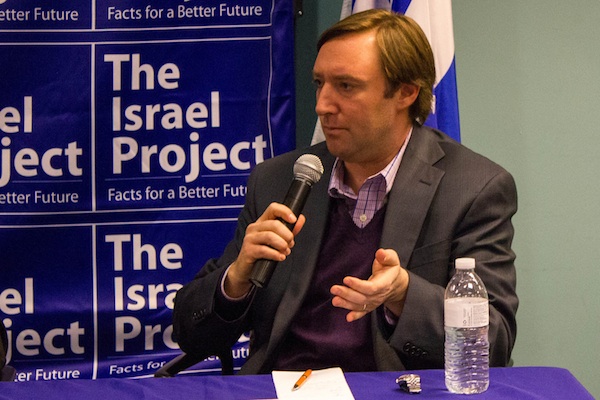by Ali Gharib
Perhaps some right-wing Israel lobby groups can be forgiven for taking up the cause of the exiled Iranian opposition group, the Mojahedin-e Khalq (MEK). The more ignorant among them might see a group headed by a woman, Maryam Rajavi, who claims to champion a secular, human rights-respecting democracy in Iran. They don’t know about Rajavi and the MEK’s history: its violence, its cult-like behavior, and its own history of human rights violations. What they do see—however problematic it might be for the rest of us—is a group monomaniacally focused on overthrowing their nemesis, the Islamic Republic, and that’s good enough.
But the Israel Project (TIP), which featured Maryam Rajavi in an online video earlier this month denouncing the Iranian elections, gets no pass on using the MEK as a bludgeon against Iran. That’s because the Israel Project knows damn well what Rajavi and the MEK are. Consider what TIP head Josh Block had to say about the group in 2011, when he was at the inaptly named Progressive Policy Institute: “The MEK is a terrorist organization. Right? Let’s not kid ourselves.” Yes, let’s not.
And yet the revisionism required to accept the latest TIP video’s promotion of Rajavi seems like a huge joke. It’s bad enough that the spot seeks to leverage statements by true defenders of Iranian human rights to suit its agenda—torpedoing the nuclear accord with Iran and, one presumes, eventually toppling the regime by whatever means necessary—but then here comes the MEK. The video holds up Rajavi as an “exiled leader.” Leader of what? The Israel Project doesn’t say, and that itself is deeply problematic. It creates the impression that Rajavi is the head of an opposition movement that extends beyond merely the diehard adherents of the MEK.
A History with MEK
This isn’t the first time a right-of-center pro-Israel group has sought to bolster its anti-Iran messaging with the MEK. As the MEK lobbied to be removed from the US list of terrorist organizations, it enlisted the help of many pro-Israel figures. Perhaps the most anti-Iran Democratic senator, Bob Menendez of New Jersey, a perennial favorite of pro-Israel advocates, became the largest recipient of MEK cash—and worked to promote their interests—after the group was finally delisted in 2012. And during the fight over the Iran deal, the influential American Israel Public Affairs Committee (AIPAC) relied on the MEK for television ads put out by its anti-deal spin-off, Citizens for a Nuclear Free Iran. Another ad by the group featured a military “expert” who just adores the MEK and even praised the group’s intelligence-gathering capabilities despite its embarrassingly well-known shortcomings.
Even the Israel Project, where, again, head honcho Josh Block considers the MEK a “terrorist organization,” has been playing this game. Just a few short days after the nuclear deal was struck the Israel Project’s Facebook page linked to an article from a ridiculously right-wing Jewish website approvingly quoting Rajavi’s opposition to the deal.
Here’s the thing: You really don’t need the MEK to tell you the Iranian elections are not, to say the least, free and fair. So what purpose does Rajavi’s inclusion serve here? A symbiotic one where the MEK tells these pro-Israel hawks exactly what they want to hear, and in return the groups portray the ex-terrorists as exactly what they are not: a reliable and respectable voice for shaping the future of Iran.
Therein lies an irony. With its assault, earlier in the short video, on the Islamic Republic’s byzantine and constrictive electoral regulations—where an unelected clerical body approves candidates or, more to the point, rejects them—the Israel Project was on the right track. Unless you are dead-set on regime change, Iran’s embattled reformers hold the key to ameliorating what ails that ancient land. And that’s why the Guardian Council locks them out. That said, Iranians have shown an irrepressible desire for reform even when the capital-R Reformers were locked out. In this election, that meant holding their noses and aligning with less-reform-minded figures, such as those belonging to moderate president Hassan Rouhani’s pragmatic conservative camp and even a few conservatives who were still not reactionary. In that, the bid that they played to, Iran’s reformers had a relatively successful election.
Misreading the Green Movement
But even this the Israel Project cannot get right. Just after Rajavi fades off screen in the TIP video, an image of a bloody protester appears. “When Iran faced true moderates in 2009,” blare the block letters in the lower third, referring to the Iranian Green Opposition movement, “they slaughtered 36 people in the street.”
Josh Block might be happy to seize the Green Movement’s mantle, but only now that it is soaked in blood spilled by the regime. It is a grotesque display. Before the 2009 election, Block was saying the same things about the Reformists that would lead the Green Movement as he is today saying about the Rouhani-style moderates the Reformists have formed a tactical alliance with. In June 2009, when he was the spokesman for AIPAC, Block told the Jewish Telegraphic Agency, “All the candidates are selected and approved by the Mullah-run Guardian Council, which approves a few and spikes hundreds, so it’s more like an ‘election’ in the old USSR than anything else.”
Maybe, in a few years, Block will be singing Rouhani’s praises, claiming his mantle as well. This much is certain: as long as Block and his Israel Project are willing to leverage and boost Maryam Rajavi and the Mojahedin-e Khalq—a group that, again, Block thinks is a “terrorist organization“—they ought not to be taken very seriously on either Iranian politics or American Iran policy.
Photo: Josh Block





